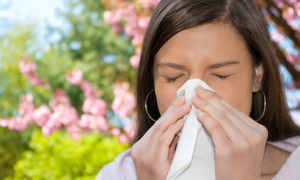MEDIA // ARTICLE

Tips for Surviving Allergy Season
March 04, 2026 at 10:00 AM EST.The first day of spring often signals a trip to the store to buy a new sundress, some flower seeds and- allergy medicine. If scratchy eyes and a runny nose are an annual ailment, you’re not alone. Roughly 40 million US citizens have some type of indoor or outdoor allergy, known as hay fever. Lucky for you, we’ve got tips from some top docs on how you can combat annoying allergies:
Tip #1: Know where your allergies originate.
The most common allergy perpetrators include tree, grass and weed pollen, mold spores, dust mite and cockroach allergens, and cat, dog and rodent dander. Now that you know what you’re most likely allergic to, take steps to protect yourself. You don’t have to avoid being outside all spring, but if you’re going to be cutting the grass, consider wearing a protective allergy face mask. A “respirator mask” with a high efficiency particulate air filter could significantly help you, as could even a disposable paper mask. Skipping an outdoor run and working out inside could also really prevent you from breathing in too much pollen.
Tip #2: Treat allergies early.
Most people don’t realize how early allergy season actually starts. Pollen starts floating through the air as soon as the trees begin to bud. Depending on where in the country you are, that could be as early as February. This means that if you take an allergy medication, you should have started it in mid- to- late February, before you start feeling symptoms. Medicating early could prevent a snowball of symptoms.
Tip #3: Pick the right medication.
There are a lot of over-the-counter medications used to help control seasonal allergies: nasal sprays, inhaled corticosteroids and antihistamines, oral antihistamines, and decongestants. If you have mild symptoms, nasal sprays/inhalants and oral over-the-counter antihistamines are your best bet. Antihistamines are not addictive, but they can lose some effectiveness if used continually. Therefore, if your symptoms are ongoing but mild, consider switching brands periodically to keep them at bay. If you plan to use them during the day, make sure you’re picking up “nonsedating” versions of antihistamines.
Decongestants aren’t the best idea for allergies. Allergy experts say decongestants are actually intended for use with a cold- seven days or less. Allergies can last for weeks. Decongestants work by reducing the blood flow to your nose, allowing you to breathe easier. But they’re intended for a short period of use. Using a decongestant for more than a week could cause rhinitis medicamentose, where rebound nasal congestion occurs every time the medication wears off. Also, be aware that oral decongestants can cause significant side effects, including elevated blood pressure, nervousness, and heart palpitations.
Tip #4: Keep clean.
One of the best ways to help ease allergy symptoms and keep them from getting worse is to wash more often than you normally do. Wash your eyelids when you wash your face in the morning. Shampoo your hair at night if you’ve been outside. Change your clothing before going into the bedroom to reduce pollens from being brought inside. Wearing a wide brim hat will help prevent pollens from sticking to your hair. Hair gel and other similar hair-care products actually act as magnets during allergy season, so stay away from those products if possible. Never line dry your clothing outdoors on high-pollen days, as it will stick to your sheets, towels and clothing.
When driving in your car, keep the windows up and re-circulate your air. Allergy experts say recirculating air through the car's cabin filter can help with allergies. In the same thread, get a high-efficiency furnace filter (MERV level 11 or 12 is what you're looking for) for your house, and be sure to change it every spring and again in early summer. You can also cut down on circulating allergens by using a HEPA filter on your vacuum- also change the filter and clean your vacuum often.
One "don't" for coping with allergies indoors: vaporizers and humidifiers. Increasing the humidity in your home can actually lead to problems with mold and dust mites.
Tip #5: Try some natural remedies.
One popular allergy buster is the neti pot, which flushes out your nasal cavities using gravity to rise them with saline. Studies have shown that neti pots are an effective way to deal with allergy symptoms. However, while they’re rinsing the mucus and irritation out of your nose, they’re not actually removing the pollen. Pollen is the main culprit when it comes to allergies, so a neti pot is minimizing seasonal allergy symptoms, but it won’t stop them entirely.
One remedy that researchers do agree works is immunotherapy for allergies, or “allergy shots”. Allergy shots work by exposing the immune system to small amounts of an allergen, over time and in increasingly larger doses. The body eventually learns not to see it as a foreign invader and should develop a tolerance. Clustering is even more aggressive. Allergy shots are usually started in January, with effects usually kicking in around April. Clustering takes more of your time at the beginning, but you can build up to full effectiveness within just four to five weeks. Two times a week, you get a shot, wait a couple of hours, and then get a second shot
No matter which approach you take, allergies are more than just a nuisance you have to tolerate. There are ways to be allergy free, or at least allergy symptom free. Whether your allergies cause just a little irritation or knock you off your feet, there are ways to minimize their impact and get on with enjoying your spring and summer!
